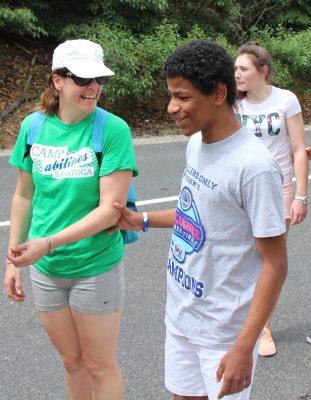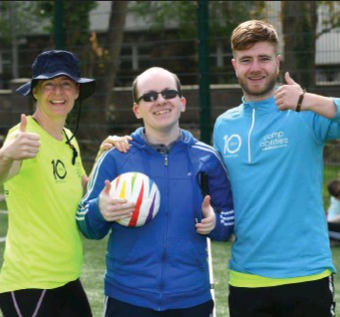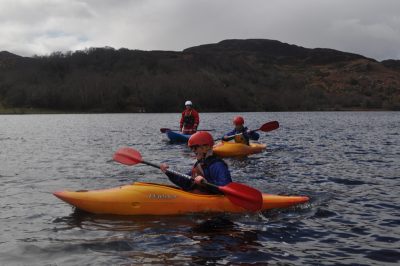By June Converse.
Ursula Barrett’s entire professional life has focused on providing recreation and sports to the citizens of Ireland. Currently, she is in her 15th year as a lecturer in the Health and Leisure Program at Munster Technological University. She and her colleagues opened their first Camp Abilities in 2010 and have not missed a year.
I was privileged to spend an afternoon chatting with Ursula and am excited to share her mission and enthusiasm on Camp Abilities World.
From Theory to Experience
Much like Lauren’s path led her to Adapted Physical Education and Camp Abilities, Ursula’s professional life started in disability services where she worked to link people with disabilities into sports and recreation in their communities. Her next stop was in community sports development and creating programs to get people active. Combining the two fields has placed Ursula in the perfect position to make a life-changing impact on the lives of others.
“A big part of our education program is to incorporate practical skills through exposure to people with disabilities. There is no point in just learning theory. You need to experience working with people with various disabilities so that you know how to adapt. You need to learn that in real life.”
After attending several conferences, and studying the research, it was clear Ireland needed a center to take on the responsibility “to shine the spotlight on creating opportunities in sport and physical activity for people with disabilities”. The Cara Center was established and is directed by Niamh Daffy (Cara is the Irish word for “friend”.) Ursula and Niamh worked together and realized “the group who [needed opportunities] the most was children with vision impairments.”
“If you don’t get the kids involved, you can’t get the adults. We had to start with the kids.”
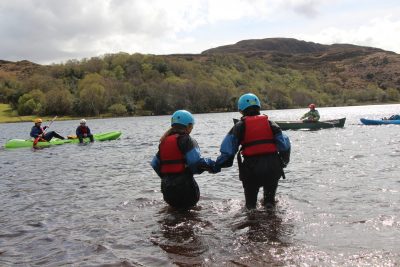
Camp Abilities Ireland
Niamh had worked at Camp Abilities in Brockport with Lauren. Ursula had met Lauren in conferences. “Camp Abilities was the ready-made solution.”
Camp Abilities Ireland began with two adults (Ursula and Niamh), a small group of students and fourteen campers. They bartered for space in a hostel and used the local school facilities. “We ran most of the activities ourselves. We were really buzzed. The kids really responded. The energy coming away from camp was very high.”
Realizing Camp Abilities was the perfect opportunity to get university students in the Health and Leisure Program involved, Ursula made participation in the camp mandatory but soon dropped the requirement. “We learned we get a higher caliber candidate when they volunteer rather than are mandated. We now have returning volunteers who are really good quality. We are no longer starting from scratch every year.”
“We looked at what’s best for the camp experience, because that’s ultimately what all the programs should be about. That’s my own ethos – the quality of the experience is core. That’s the center of our decision making.”
For the past 11 years, Camp Abilities has grown from 14 campers living in a hostel to 40 living at the Cappanalea Outdoor Education Camp. But, as with all camps, there is limited capacity. “We prioritize kids who haven’t come before – kids who need the experience.
One of the initial partners was the National Council for the Blind, who helped identify and contact every child who was visually impaired. “They saw what was happening at camp and they saw other opportunities, like cooking skills and independent living skills. They got more and more interested and more and more involved. We found their community resource workers knew the kids and were best placed to refer kids to camp who would benefit, and who were ready to attend an overnight camp.”
The National Council for the Blind now manages Camp Abilities Ireland. “It’s been a great partnership. They assist with financing and have many resources to help the camp and the campers.”
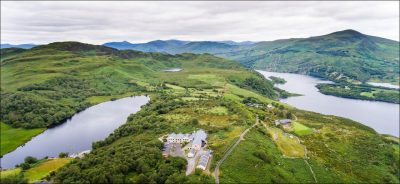
The Uniqueness of Camp Abilities Ireland
The Ireland camp is held over Easter break instead of the summer because kids and volunteers are more available. But, more importantly, “We’re trying to build up their skills, their competence, so that they would actually be able to participate in mainstream summer camps.”
Kids from every county in Ireland come to Cappanalea. “It’s in the middle of nowhere, in County Kerry near the small town of Killorglin. We can’t even get a phone signal, which is great. It’s so remote the busses can barely use the roads. When you look out the window, all you see are lakes and land. There are dormitories and staff quarters. Everything we need for this age group in one place. They are very open to our using the facilities and to inclusion. We can rock climb and kayak and do other outdoor sports there.”
Camp is not free. “We want our campers to be treated like everyone else and camp is not free for other students. Our fees are on the lower end of the scale for other camps. And, of course, if someone has financial hardship, we do have resources available.”
While camp has introduced Gaelic football (a mix of American football and European soccer) and hurling (“one of the fastest games in all sports”), they prefer to introduce sports and adaptations where there is a pathway to participate in the community and rise to competition level if they so choose.
“The favorite sport is judo. They love tossing people around. But the achievement they are most proud of is rock climbing. Even walking to the rock climbing is difficult because of depth perception issues. It’s not a rock-climbing wall, the kids are on the face of a cliff!”
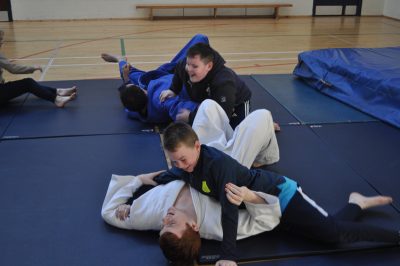
Advocacy
Camp Abilities Ireland takes a deliberate four-pronged approach to teach and reinforce self-advocacy.
First, the camper experiences the adaptations.
Second, campers are asked to reflect and to truly understand what they enjoyed, what they need, and what worked for them as individuals.
Third, they practice how to make suggestions to the coaches back home. They learn to offer solutions, and to help coaches make accommodations.
Fourth, feedback is given to the parents on what the camper enjoyed and the specific adaptations and resources available.
The Specialists
“We decided early on to expose the campers to more than sports. In order to make that a priority, three counselors are selected to provide special attention during the week of camp, working within the groups and with individual campers as needed.”
- The Sports Coach ensures the campers understand the sports and adaptations.
- The Social Coach ensures each kid has friends and opportunities to mix with other campers.
- The Life Skills Coach ensures each camper has many opportunities to be as independent as possible – learning to get from A to B without assistance, cleaning the tables, making their lunch, cooking from scratch, making their own bed, unpacking and sorting belongings, etc.
“We are now getting volunteers who have visual impairments themselves and volunteers who are occupational therapists. It’s a really good mix because they provide different areas of expertise and they watch for ways to help kids achieve during the week.”
“We have kids come back to us and say:
‘I don’t know if I would have gone to college if I had not gone to camp.’
‘Until camp, I hid my visual impairment.’
‘You helped me get comfortable with my impairment.’
‘I dressed my bed for the first time on my own.’
We want to see the camp go from strength to strength. It’s the little things we take for granted that the kids really appreciate being able to accomplish. And you should see the looks on the parents’ faces!”
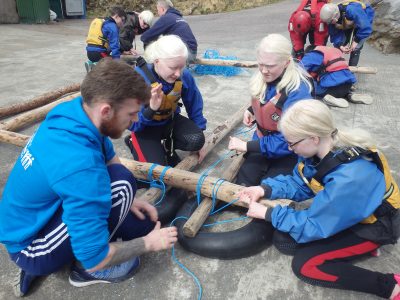
A Challenge and A Solution
“The one challenge we found, and it was very much an issue in our 2019 camp, is kids with mental health struggles. We’ve had self-harm and suicidal ideology issues. We felt ill-equipped to handle these issues and sadly had to send one camper home. In the future we are going to have a trained counselor dedicated to help in this area.”
Growing Leaders
When a camper is 16 or 17 years old, they participate in an interview process and may move into a leadership role, where they are challenged to a greater extent. These leaders are expected to plan and conduct an expedition. They pack their tents and hike into the wilderness. They sail and canoe, pitch their own tents, make their own food. After their expedition is completed, they are expected to mentor the younger campers, lead activities and engage.
“We did an exchange program with Camp Abilities Utah. We sent three campers. They sent three campers. It’s one thing to go to camp. It’s a whole new thing to go to camp in another country. It was great, just great!”
Casino Night
As with all Camp Abilities, the fun and challenges do not stop at sundown. There are trivia and quiz games, campfires, talent shows, cookery nights. “This is where we get really creative. The first year we had Casino Teams. Each of the kids had fake money and they could gamble. We didn’t have slot machines of course. Instead, they had to pull down the arm of a camp volunteer and three other volunteers randomly pulled out a piece of fruit. If the three pieces matched, the camper won money. The teams then pooled their money, and we held an auction. In the auction they bid on twine and bubble wrap and newspaper and other strange things. They had no idea why they needed those items. Later that week they used their materials to make an egg protector. We dropped those eggs to see which survived the fall.”
Favorite Camp Memory
I asked Ursula, after 20 years of camp, what was her favorite memory. You see her shuffle memories through her mind, trying to land on one when there were so many special choices. Finally, she chose this:
“I volunteered at camp in Portugal. I was quite nervous because I don’t speak any Portuguese. At the end of every day, the campers and all the workers are given three flowers. Each flower is presented to someone in the camp. ‘I am giving you this flower because you [fill in the blank].’ It’s a great way to encourage and reflect. I decided I would deliver my flowers in Portuguese. I practiced all day with my campers. I felt part of their family. It was great to connect on that level.
We implemented a similar program at our camp. In the small groups, campers pick out specific moments of the day to share and praise. It’s camper-to-camper because it’s good to hear from a peer. In some ways it’s more valuable to hear from a peer.”
Ireland, Education and the Visually Impaired
Over the last two decades, the goal in Ireland has been to move children from segregated school to the mainstream school. Much like the United States, the education system, while committed to providing an adequate level of support, often falls short.
Ireland passed the EPSEN Act (Education for People with Special Education Needs) in 2004. The Act required a variety of measures be implemented on a specified timeline. In 2008, the recession hit Ireland hard and implementations were delayed. “There is supposed to be an assessment. There are supposed to be resources. They are supposed to do an Individual Education Plan (IEP). Some schools do it, some do not. It’s not mandatory at the moment but it is in the EPSEN Act. That was one of the areas they didn’t follow through. And one we really need to get mandated.”
The schools provide a visiting teacher but most of the accommodations fall to the classroom teacher. “The willingness and ability vary. We have some kids having to move schools in order to get enough support.”
As part of the research at Camp Abilities, they discovered many children in the mainstream system pretend they aren’t visually impaired, pretend they can see the material, pretend they can keep up. “They don’t want to spotlight it [the visual impairment]. They just muddle on, even if they’ve missed something. They don’t ask questions. That’s tiring for them. But when they came to camp, it was normal to have a visual impairment. It was nice to be able to talk to someone who understood.”
“I remember my first camp, I was in the boys’ room and they were doing that farting thing under their arm (which Ursula demonstrated for me). But they were also talking about school. One child had a cane and was able to explain where he got it, how it helped. They were able to give lots of tips to each other. That’s a major benefit to Camp Abilities.”
“We learned that several of the kids created groups outside of camp. They arrange weekends together and go to sports and other activities. Friends who understand are at the other end of the phone if they need someone.”
Beyond Camp Abilities: Advocating for Campers
“Campers keep in touch with us after camp and ask for help when they come up against barriers in their community, sometimes it is breaking the barrier down and finding solutions such as training for teachers/coaches, making organizations aware of their responsibilities under the legislation or providing some extra training or volunteer support to the camper for activities in school, extra-curricular activities, or sports in their community.
We hear about kids who ask to sit in the front of the classroom and are denied.
“Mad, mad things!”
“It’s frustrating and why Camp Abilities is so important. It’s one week a year where the campers are spared dealing with inclusion issues.”
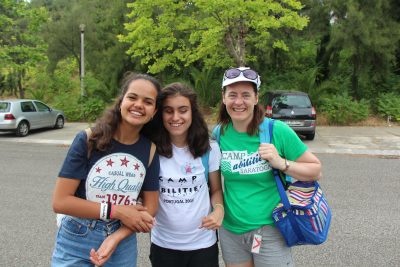
Ursula’s Magic Wand
I asked Ursula what she would change if given a magic wand, what would she change first to create utopia.
“I would hypnotize coaches and teachers to unblock this barrier attitude to including people. Often it’s not so hard and it could make things so much easier for the kids if they had the right attitude.
“We try to get this with our students as well. Camp Abilities is an education program, but I always call it an Attitude Program. It’s about shifting attitudes. We want the educators to see the person they are working with as a person first. A person who has goals and dreams that the educator is there to help them achieve. If you go in with a positive mindset, it’s certainly possible. But some people see it as more work and there’s the barrier. They aren’t looking for solutions. I’d wave a magic wand over people’s heads.”
Eleven Years Later
2020 and the COVID crisis forced Camp Abilities Ireland to go virtual and it appears 2021 will be virtual also. Whatever form camp takes, Ursula will be there.
“That week of Easter is on my calendar until I retire. It’s a week I look forward to every year.”
~submitted by June Converse
Note: Munster Technological University was formed on 1st January 2021 when Cork Institute of technology merged with the Institute of Technology, Tralee
~ A LOSS OF SIGHT, NEVER A LOSS OF VISION ~

